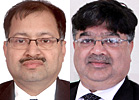
Ashamed At Sorry State Of Affairs In India: Mohan Parasaran, SG*
Editorial Staff
Solicitor General Mohan Parasaran, who is highly regarded for his legal acumen, court craft and ice-cool temperament, has, on the eve of his resignation from the post, spoken his heart out on the ills plaguing the Country and what can be done to salvage the situation
*Title changed from “Ashamed To Be Indian” as the context appears to have been misunderstood by readers
Survival as top law officer was a “sheer miracle”
Mohan Parasaran did not mince any words in expressing his unhappiness at the way the Government functioned. He said it was a “sheer miracle” that he survived 10 years as the top law officer of the Country. He pointed out that appearing for the Government is like facing a fast bowler in a cricket match without the basic safeguards like pads, gloves, helmet etc. He lamented that the briefs get delivered at the last minute and there are no instructions on what is required to be done. There is a communication gap between the various ministries and the concerned ministry would not even be aware that its’ matter is coming up for hearing on a particular date, he said.
Read more ›







